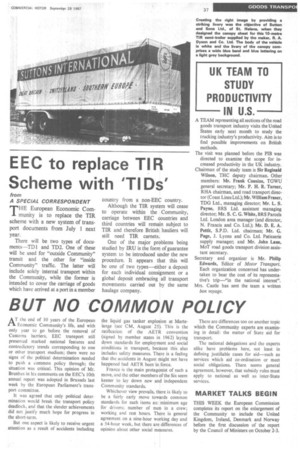BUT NO COMMON POLICY
Page 39

If you've noticed an error in this article please click here to report it so we can fix it.
Al'the end of 10 years of the European Economic Community's life, and with only year to go before the removal of Customs barriers, EEC transport still presented marked national features and contradictory trends corresponding to one or other transport medium; there were no signs of the political determination needed to push a common policy through; the situation was critical. This opinion of Mr. Brunhes in his comments on the EEC's 10th annual report was adopted in Brussels last week by the European Parliament's transport committee.
It was agreed that only political determination would break the transport policy deadlock, and that the slender achievements did not justify much hope for progress in the short-term.
But one aspect is likely to receive urgent attention as a result of accidents including
the liquid gas tanker explosion at Martelange (see CM, August 25). This is the ratification of the AETR convention (signed by member states in 1962) laying down standards for employment and social conditions in transport, because this also includes safety measures. There is a feeling that the accidents in August might not have happened had AETR been in force.
France is the main protagonist of such a move, and the other members of the Six seem keener to lay down new and independent Community standards.
Whichever view prevails, there is likely to be a fairly early move towards common standards for such items as: minimum age for drivers; number of met in a crew; working and rest hours. There is general agreement on a nine-hour working day and a 54-hour week, but there are differences of opinion about other social measures.
There are differences too on another topic which the Community experts are examining in detail: the matter of State aid for transport.
The national delegations and the experts alike have problems here, not least in defining justifiable cases for aid—such as services which aid co-ordination or meet social obligations. There seems general agreement, however, that subsidy rules must apply to national as well as inter-State services.
MARKET TALKS BEGIN
THIS WEEK the European Commission completes its report on the enlargement of the Community to include the United Kingdom, Ireland, Denmark and Norway before the first discussion of the report by the Council of Ministers on October 2-3.




































































































































































